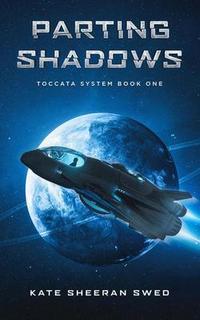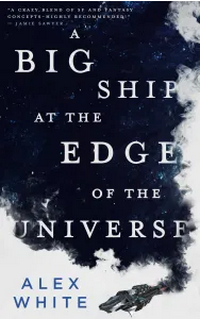 |
A Big Ship at the Edge of the Universeby Alex White Trade Paperback, 440 pg. Read: April 16-22, 2021 |

“If we separate, our odds of survival go down, and make no mistake, I know odds better than anyone you ll ever meet.”
She tongued the inside of her cheek as she thought it over. ‘Interesting …1 figured you’d be happier with me dead.”
“Oh, I might. But I should also point out that your presence seduces the chance I’ll be shot first. So do we have a deal?”
He snatched up her whiskey bottle and tipped the neck slightly toward her. She clinked her tumbler against it.
“All right. Until we salvage the Harrow, consider me part of the crew.”
What’s A Big Ship at the Edge of the Universe About?
To really explain the set-up to this novel would take more time than I have to write, and more time to read than you want to give—that’s not an insult, if you’re going to spend time reading the elaborate set-up, you’d be better off with White’s prose than mine. But let’s see if I can give a very sketchy version.
This is a Space Opera with a pretty elaborate magic system—almost every person is born with an innate ability. An ability to augment their electronics/engineering capability; their medical abilities; their marksmanship; and so on. A small, pitiable few have no magical ability.
One such person is one of our protagonists, Elizabeth “Boots” Elsworth, is one. Despite her lack of magic, she was a fantastic combat pilot. After the war, she gained some fame (and not that much money) hunting for a treasure on a reality show. Since then, she’s eked out a living selling the equivalent of treasure maps for other would-be treasure hunters—many of which contain actual, verifiable information.
The other protagonist is Nilah Brio, one of the greatest living race drivers—she’s on the cusp of winning the Pan-Galactic Racing Federation’s Driver’s Crown, when mid-race a magic-user of great ability interrupts things, kills another driver, and frames her for it.
Both of these women have somehow become the targets of a secret conspiracy that’s tied to the Harrow. The Harrow is a space ship of tremendous power and as likely to exist as Atlantis. They’ve also found themselves on board the Capricious, the ship Boots served on during the war—still Captained by the same man, with a new crew and purpose. They’re salvagers and the victims of one of Boots’ faux-maps.
Boots is able to convince the crew to join her on the hunt for the Harrow to square her debt (and then some) and Nilah is along for the ride for various and sundry reasons.
This Novel Reminds Me Of…
There’s the dark conspiracy of The Expanse, the found family feel of Chambers’ The Long Way to a Small, Angry Planet, a magic system reminiscent of The Codex Alera (without the abilities having personalities…) mixed with that of the Alex Verus series*, and a tone that’s in the same neighborhood as Kings of the Wyld. All of which makes for an entertaining read that should appeal to many SF readers.
* Not really, but it’s the best I can come up with at the moment.
“…Hunter One and Two, standing by for orders.”
Those were the code names they’d been given. A few months ago, basking in the luxury of a PGRE hospitality suite, Nilah would’ve thought a code name was cool. Now, it just meant she was doing something stupid. Worse still, she was Hunter Two, and she had a pathological hatred of being second.
So, what did I think about A Big Ship at the Edge of the Universe?
It was pretty good. In theory, this is exactly the kind of read that should appeal to me—this isn’t just in my wheelhouse, it is my SF wheelhouse. I had a lot of fun reading it, I liked the characters, I thought White did the battle scenes right (no mean feat), and I thought the whole thing was pretty exciting.
But I didn’t click with it. I can see much/most of what White was trying to do, and think he pulled it off. I can see where people would really dig this and want to go immediately scrambling for the rest of the trilogy. But it just didn’t resonate with me. I’ll likely get around to the rest of the trilogy soon—and I may end up a die-hard fan. But for the moment, the best I can say is, “yeah, it’s all right.”
This is a well-written novel full of all the things I listed above and should have a cadre of die-hard fans. I’m missing out on something that I’m not one of them—but you likely could be. If any of this seemed interesting to you, I’d recommend giving it a shot. If you do, come back and tell me what I missed, would you?

This post contains an affiliate link. If you purchase from it, I will get a small commission at no additional cost to you. As always, opinions are my own.
![]()



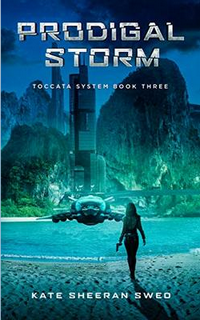


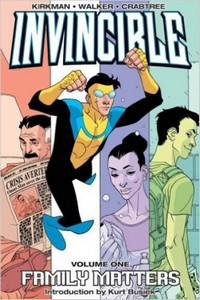

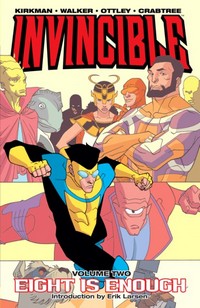
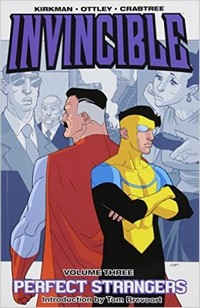

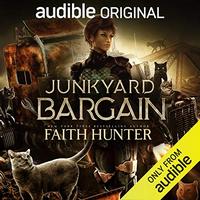

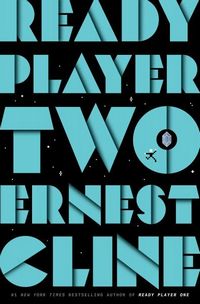
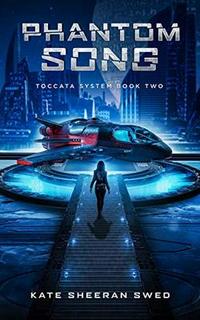

 Grab a book, any book.
Grab a book, any book.